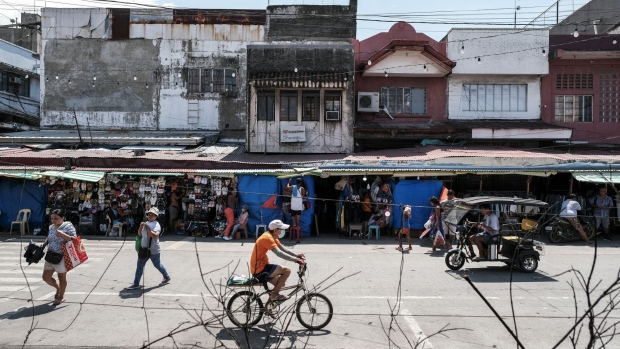Apr 19, 2024
Philippines’ Recto Sees Rate-Cut Delay Risk If Peso Sinks to 59
, Bloomberg News

(Bloomberg) -- Philippine Finance Secretary Ralph Recto cautioned that his nation may see a delay in interest-rate cuts should the peso weaken past the record low of 59 per dollar, though that wouldn’t damage the economic growth outlook.
“Even if we hold off in reducing interest rates, we expect the Philippine economy to still grow between 6% to 7% this year,” Recto said in an interview Friday with Bloomberg Television in Washington, where he was attending spring meetings of the International Monetary Fund and World Bank.
Recto is part of Bangko Sentral ng Pilipinas’ seven-member policymaking board. He spoke after the peso fell past the closely watched 57-per-dollar level for the first time since 2022 — part of a broader drop in risk assets in the wake of Federal Reserve Chair Jerome Powell’s April 16 signal of delays in US rate reductions.
Policymakers across the world, including in the Philippines, have indicated they’re not in a rush to lower borrowing costs, and want to see more evidence of firmly decelerating price pressures before pivoting to easing.
BSP Governor Eli Remolona has kept a broadly hawkish stance and stuck to guidance that further monetary tightening is unlikely, saying the peso’s weakness is mostly due to dollar strength. The central bank may have to consider a rate hike if inflation expectations are unanchored, the governor said earlier this week.
The Philippines trimmed economic growth forecasts for this year and next amid stubborn inflation and elevated interest rates, while widening its fiscal deficit estimates to support higher spending.
Debt Issuance
Recto said Friday that the government plans to tap the international debt markets this year and may come up with an offering “early on.”
About a quarter of the government’s funding requirements are sourced from external sources, including multilateral lenders such as the World Bank and the Asian Development Bank. “That’s roughly about $9 billion, this year until 2028 more or less,” Recto said.
The government made two ventures into the international dollar bond market in 2023, with a $3 billion three-part deal in January that year and another $1 billion in its first Islamic note in November.
The Philippines, which has investment-grade sovereign credit ratings, also wants to broaden the base of its bond investors as it looks to fund a budget deficit of about 1.5 trillion pesos ($26 billion) in 2024 and support economic growth.
--With assistance from Ditas Lopez and Andy Clarke.
(Updates with more comments from Recto)
©2024 Bloomberg L.P.






